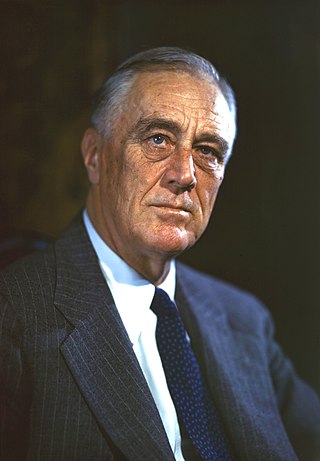
Franklin Delano Roosevelt, commonly known as FDR, was an American statesman and politician who served as the 32nd president of the United States from 1933 until his death in 1945. Roosevelt directed the federal government during most of the Great Depression, implementing the New Deal in response to the worst economic crisis in American history. He also built the New Deal coalition, realigning American politics into the Fifth Party System and defining American liberalism throughout the middle third of the 20th century. His third and fourth terms were dominated by World War II.
The New Deal coalition was an American political coalition that supported the Democratic Party beginning in 1932. The coalition is named after President Franklin D. Roosevelt's New Deal programs, and the follow-up Democratic presidents. It was composed of voting blocs who supported them. The coalition included labor unions, blue-collar workers, racial and religious minorities, rural white Southerners, and intellectuals. Besides voters the coalition included powerful interest groups: Democratic party organizations in most states, city machines, labor unions, some third parties, universities, and foundations. It was largely opposed by the Republican Party, the business community, and rich Protestants. In creating his coalition, Roosevelt was at first eager to include liberal Republicans and some radical third parties, even if it meant downplaying the "Democratic" name. By the 1940s, the Republican and third-party allies had mostly been defeated. In 1948, the Democratic Party stood alone and survived the splits that created two splinter parties.
A.L.A. Schechter Poultry Corp. v. United States, 295 U.S. 495 (1935), was a decision by the Supreme Court of the United States that invalidated regulations of the poultry industry according to the nondelegation doctrine and as an invalid use of Congress' power under the Commerce Clause. This was a unanimous decision that rendered parts of the National Industrial Recovery Act of 1933 (NIRA), a main component of President Franklin D. Roosevelt's New Deal, unconstitutional. The case from which the ruling stemmed was nicknamed the "Sick Chicken Case".
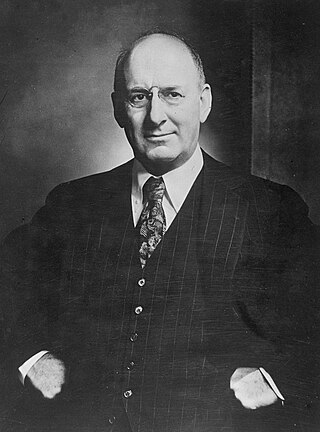
Henry Morgenthau Jr. was the United States Secretary of the Treasury during most of the administration of Franklin D. Roosevelt. He played a major role in designing and financing the New Deal. After 1937, while still in charge of the Treasury, he played the central role in financing United States participation in World War II. He also played an increasingly major role in shaping foreign policy, especially with respect to Lend-Lease, support for China, helping Jewish refugees, and proposing measures to deindustrialise Germany.

The 1938 United States House of Representatives elections was an election for the United States House of Representatives were elections for the United States House of Representatives to elect members to serve in the 76th United States Congress. They were held for the most part on November 8, 1938, while Maine held theirs on September 12. They occurred in the middle of President Franklin D. Roosevelt's second term. Roosevelt's Democratic Party lost a net of 72 seats to the Republican Party, who also picked up seats from minor Progressive and Farmer–Labor Parties.

Robert S. McElvaine is Elizabeth Chisholm Professor of Arts and Letters and Chair of the Department of History at Millsaps College in Jackson, Mississippi, and the author of eight books and the editor of three. He is considered one of the world's leading historians of the Great Depression. McElvaine is also known for his work on the centrality of misperceptions of differences and inequality between the sexes in the unfolding of human history.
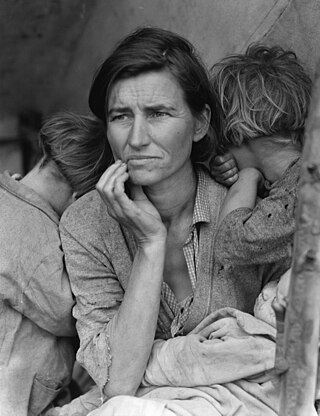
In the United States, the Great Depression began with the Wall Street Crash of October 1929 and then spread worldwide. The nadir came in 1931–1933, and recovery came in 1940. The stock market crash marked the beginning of a decade of high unemployment, poverty, low profits, deflation, plunging farm incomes, and lost opportunities for economic growth as well as for personal advancement. Altogether, there was a general loss of confidence in the economic future.

Raymond Charles Moley was an American political economist. Initially a leading supporter of the New Deal, he went on to become its bitter opponent before the end of the Great Depression.

Robert Patrick Murphy is an American economist. Murphy is research assistant professor with the Free Market Institute at Texas Tech University. He has been affiliated with Laffer Associates, the Pacific Research Institute, the Institute for Energy Research (IER), the Independent Institute, the Ludwig von Mises Institute, and the Fraser Institute.
The Second New Deal is a term used by historians to characterize the second stage, 1935–36, of the New Deal programs of President Franklin D. Roosevelt. The most famous laws included the Emergency Relief Appropriation Act, the Banking Act, the Wagner National Labor Relations Act, the Public Utility Holding Companies Act, the Social Security Act, and the Wealth Tax Act.
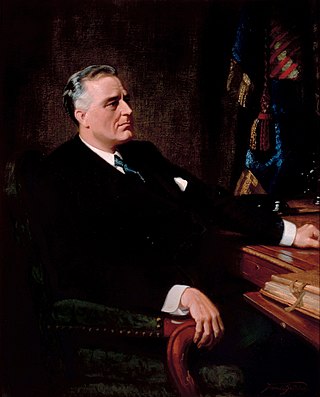
Before, during and after his presidential terms and continuing today, there has been criticism of Franklin D. Roosevelt (1882–1945). His critics have questioned not only his policies and positions, but also accused him of trying to centralize power in his own hands by controlling both the government and the Democratic Party. Many denounced his breaking of a long-standing tradition by running for a third term in 1940.

Amity Ruth Shlaes is an American conservative author, writer, and columnist. She writes about politics and economics from a classical liberal perspective. Shlaes has authored five books, including three New York Times Bestsellers. She currently chairs the board of trustees of the Calvin Coolidge Presidential Foundation and serves as a Presidential Scholar at The King's College in New York City. She is a recipient of the Bastiat Prize and, more recently, the Bradley Prize.

The Conscience of a Liberal is a 2007 book written by economist and Nobel laureate Paul Krugman. It was 24th on the New York Times Best Seller list in November 2007. The title was used originally in Senator Paul Wellstone's book of the same name in 2001. Wellstone's title was a response to Barry Goldwater's 1960 book The Conscience of a Conservative. In the book, Krugman studies the past 80 years of American history in the context of economic inequality. A central theme is the reemergence of both economic and political inequality since the 1970s. Krugman analyzes the causes behind these events and proposes a "new New Deal" for America.

The New Deal was a series of programs, public work projects, financial reforms, and regulations enacted by President Franklin D. Roosevelt in the United States between 1933 and 1939. Major federal programs and agencies included the Civilian Conservation Corps (CCC), the Works Progress Administration (WPA), the Civil Works Administration (CWA), the Farm Security Administration (FSA), the National Industrial Recovery Act of 1933 (NIRA) and the Social Security Administration (SSA). They provided support for farmers, the unemployed, youth, and the elderly. The New Deal included new constraints and safeguards on the banking industry and efforts to re-inflate the economy after prices had fallen sharply. New Deal programs included both laws passed by Congress as well as presidential executive orders during the first term of the presidency of Franklin D. Roosevelt.
The Forgotten Man may refer to:
Eric Rauchway is an American historian and professor at the University of California, Davis. He received his B.A. from Cornell in 1991, and his Ph.D. from Stanford in 1996. Rauchway's scholarship focuses on modern US political, social and economic history, particularly the Progressive Era and the New Deal.
This bibliography of Franklin D. Roosevelt is a selective list of scholarly works about Franklin D. Roosevelt, the thirty-second president of the United States (1933–1945).
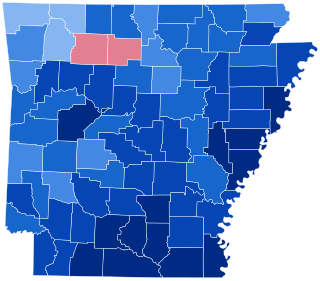
The 1940 United States presidential election in Arkansas took place on November 5, 1940, as part of the 1940 United States presidential election. State voters chose nine representatives, or electors, to the Electoral College, who voted for president and vice president.

The first term of the presidency of Franklin D. Roosevelt began on March 4, 1933, when he was inaugurated as the 32nd president of the United States, and the second term of his presidency ended on January 20, 1941, with his inauguration to a third term. Roosevelt, the Democratic governor of the largest state, New York, took office after defeating incumbent President Herbert Hoover, his Republican opponent in the 1932 presidential election. Roosevelt led the implementation of the New Deal, a series of programs designed to provide relief, recovery, and reform to Americans and the American economy during the Great Depression. He also presided over a realignment that made his New Deal Coalition of labor unions, big city machines, white ethnics, African Americans, and rural white Southerners dominant in national politics until the 1960s and defined modern American liberalism.













